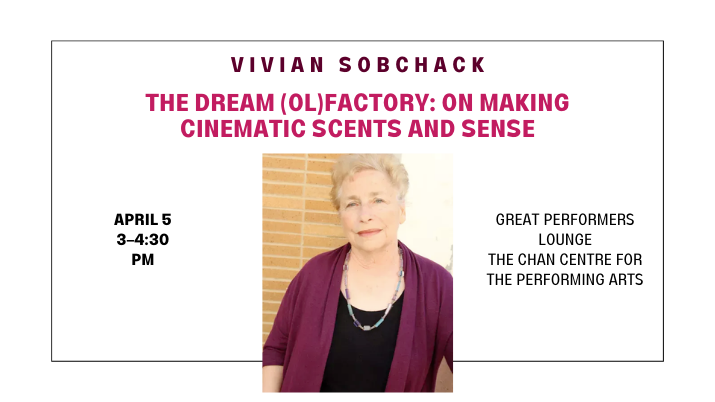

The Centre for Cinema Studies is pleased to present a research talk by renowned scholar and Professor Emerita in UCLA’s School of Theater, Film and Television, Vivian Sobchack on Friday, April 5.
About the talk


Movie poster
It is counterintuitive to suggest that we might “smell” a film, although in vernacular language we often say one “stinks.” Can we even propose a film as having any “aroma” at all? Focusing on the extremity Tom Tykwer’s Perfume: The Story of a Murderer (2006), this presentation considers the “problem” of smell as it relates to cinema. Both existential phenomenology and contemporary neuroscience have demonstrated that our senses are intimately interrelated and cooperative even as each allows us a quite different perceptual modality of access to the world—and to cinema. Why, then, do we so often, “feel” the movement, texture, “heft” and even the “taste” of things we see and hear onscreen, and yet so rarely (if ever) sense the “scents” of the onscreen world? Responses to this question are complex on both sides of the screen, not only because our senses and our cinematic aesthetics are always acculturated but also because of the ways in which we “make sense” of them both physically and cognitively. In sum, my presentation is a discursive exploration of viewer responses to Tykwer’s Perfume within the broader context of historical attempts to add scent to cinema and the intimate phenomenological relation between body, mind, and meaning.
About Vivian Sobchack
Vivian Sobchack is Professor Emerita in UCLA’s School of Theater, Film and Television. Her long career as teacher, scholar, administrator, and mentor spans the disciplinary history and growth of film and media studies. The first woman elected president of the Society for Cinema and Media Studies, she also served for years on the Board of Directors of the American Film Institute.
Her many essays have appeared in journals such as “Quarterly Review of Film and Video,” “camera obscura,” “Journal of Visual Culture,” “Film Quarterly,” “Film Comment,” “Representations, and “History and Theory.” Her books include Screening Space: The American Science Fiction Film; The Address of the Eye: A Phenomenology of Film Experience; and Carnal Thoughts: Embodiment and Moving Image Culture, and she has edited two anthologies: The Persistence of History: Cinema, Television, and the Modern Event, and Meta-Morphing: Visual Transformation and the Culture of Quick-Change. Her research interests are eclectic: American film genres and cultural studies; film and media history and theory; the phenomenology of audio-visual perception; and historiography and media archaeology.
She is the recipient of two major honours: in 1995, the SFRA’s Pilgrim Award for Lifetime Contributions to Science Fiction Scholarship and, in 2012, SCMS’s Distinguished Career Achievement Award.

